So, you just realized that you have bad posture.
Don’t worry, you’re not alone.
After reading this post, you are going to learn the best posture correction exercises you can do to reclaim your body today.
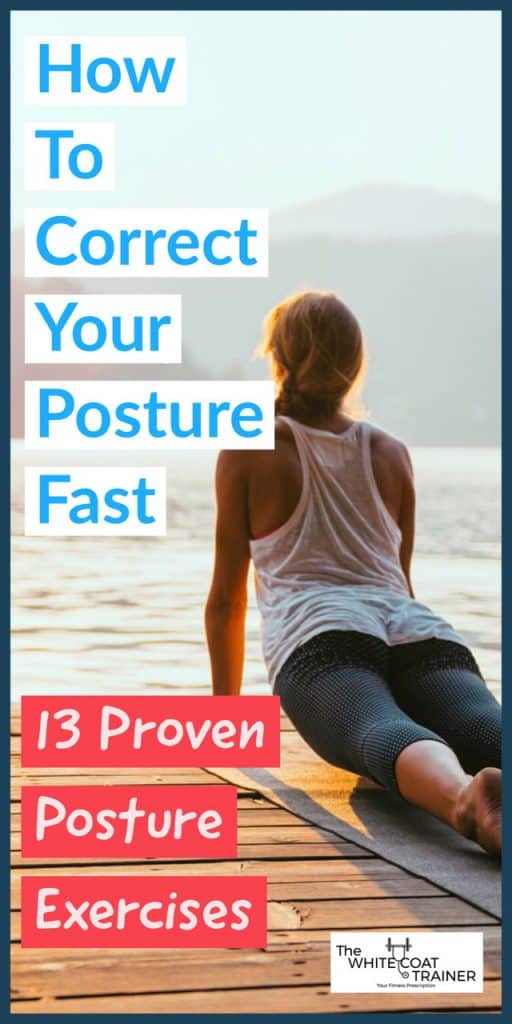
Specifically, you will learn:
- The postural muscles that are stretched and weakened in each of the 4 bad postures (as well as the muscles that are tight and overly activated)
- Stretches and exercises that can help alleviate each of the bad postures
- Simple cues that you can use to have better posture in your day to day activities
Interested?
Keep reading.
Can You Reverse Bad Posture?
In order for you to reverse your bad posture, you must understand three things:
1) Awareness of What The Bad Posture Actually Is
If you have read Part 1: Here’s How To Tell If You Have Bad Posture of this series, then you should have identified which postures you currently have.
The most common are:
- Forward Head Posture
- Internally Rotated Shoulders
- Kyphosis
- Anterior Pelvic Tilt (Lordosis)
If you don’t know you have it, then you will never be able to fix it.
2) What Exercises Help Restore Proper Posture
Once you know which of these postures you have, you can quickly refer to the section in this post that discusses the posture in detail.
Each section will show you the best exercises and stretches that you can perform to begin reversing the muscle imbalance you may have.
3) Identify The Daily Activities That Cause Poor Posture
Lastly, it is also important to be aware of your body position throughout the day.
Even if you perform the stretches and exercises outlined here, poor posture habits will negate the benefits of the treatment.
This is why we will also go over quick cues that you can use to quickly fix any postural deviations you may have throughout the day.
If you follow the advice in this article, you will begin to notice an improvement in your posture in as little as 4 weeks.
Alright, let’s get started.
Get The PDF – 10 Minute Posture Workout
For just $7, you can get our complete 10-minute posture and mobility routine.
This effective posture workout combines high-yield exercises and stretches for both the upper and lower body to restore proper posture in your entire body.
Get your copy today!
Can Forward Head Posture Be Reversed?
The first posture we’ll go over is forward head posture.
Here, your neck will be misaligned from the rest of your spine.
To reverse forward head, you will need to
- strengthen the muscles that are weak and elongated in the neck
- stretch the muscles that are tight and contracted in the neck
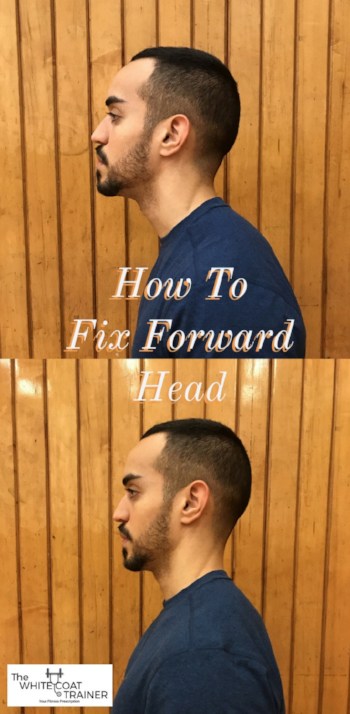
Weak/Stretched Muscles
The Neck Flexors (The Front of Your Neck)
In forward head posture, the muscles in the front of your neck are constantly stretched and never activated.
These are the muscles that bring your chin to your chest and allow you to nod.
Tight/Overactive Muscles
The Neck Extensors (The Back of Your Neck)
Conversely, the muscles in the back of the neck are in constant tension. This makes them more likely to get tight, develop muscular knots, and cause neck pain.
The main muscle is the levator scapula.
Bad Posture Exercises For Forward Head
Since the neck extensors are tight in a forward head posture, you want to avoid any exercises that extend the neck.
- This includes the neck raise exercise you may have seen people doing at the gym.
- Doing chin-ups or pull-ups incorrectly, and trying to “clear” your chin above the bar instead of focusing on your back.
- Avoid having your computer screen too high which will cause you to look up and maintain an extended neck position.
Do your best to set your chair, desk, and computer at an appropriate height to maintain a neutral neck position.
In addition, do your best to bring your cell phone to the level of your face to avoid having your neck in a sub-optimal position.
The Best Posture Correction Exercises For Forward Head
The Best Posture Correction Stretch For The Neck
Posterior Neck Stretches
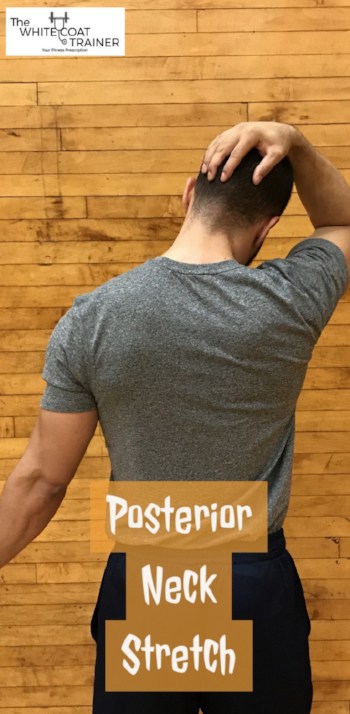
The posterior neck stretch will help elongate those muscle fibers of the levator scapulae that are tight and shortened.
Position your hand behind one side of your head and gently pull your chin toward your clavicle. Make sure not to shrug.
These can be done anywhere and everywhere. Hold for 20 seconds at a time.
The Best Neck Posture Exercise:
Chin Tucks
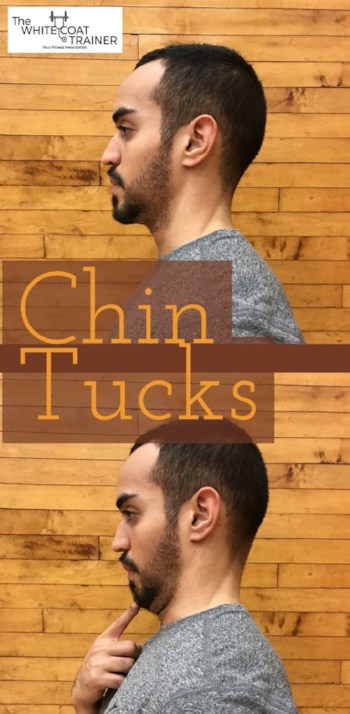
The chin tuck is one of the best neck posture exercises you can do.
Simply create a double chin by contracting the muscles in the front of your neck.
This can be done for repetitions of 5-8 after you’ve stretched the posterior neck. Hold for a 1 count.
The Trap Smash
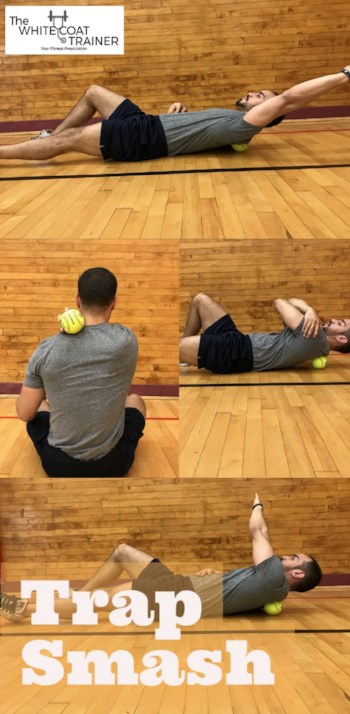
Your upper back and trapezius muscles will be full of trigger points that are tight and painful in a forward head posture.
Get yourself a Theracane or Order some Lacrosse Balls from Amazon which you can use to find your hot spots in the upper back. Apply deep focused pressure to massage those areas.
You can also move your arms in different positions to unlock different sensitive areas. 5-10 minutes of “smashing” three times a week should be sufficient.
Posture Tips to Reset the Forward Head Posture (At Home or Work)
Below is a quick reset sequence that you can do at home or at work whenever you notice that you’re not in an optimal position.
- Raise Your Chest
- Depress Your Shoulders (the opposite of shrugging)
- Bring Your Neck Back Over Your Shoulders
Okay, next we are going over kyphosis. This postural position is often found in conjunction with forward head posture.
Can A Rounded Thoracic Spine (Kyphosis) Be Reversed?
Next up is kyphosis, aka the hunchback posture. This posture is extremely common if you tend to slouch whenever you are sitting.
It is also one of the most common predisposing causes of forward head posture.
Here’s what it looks like.
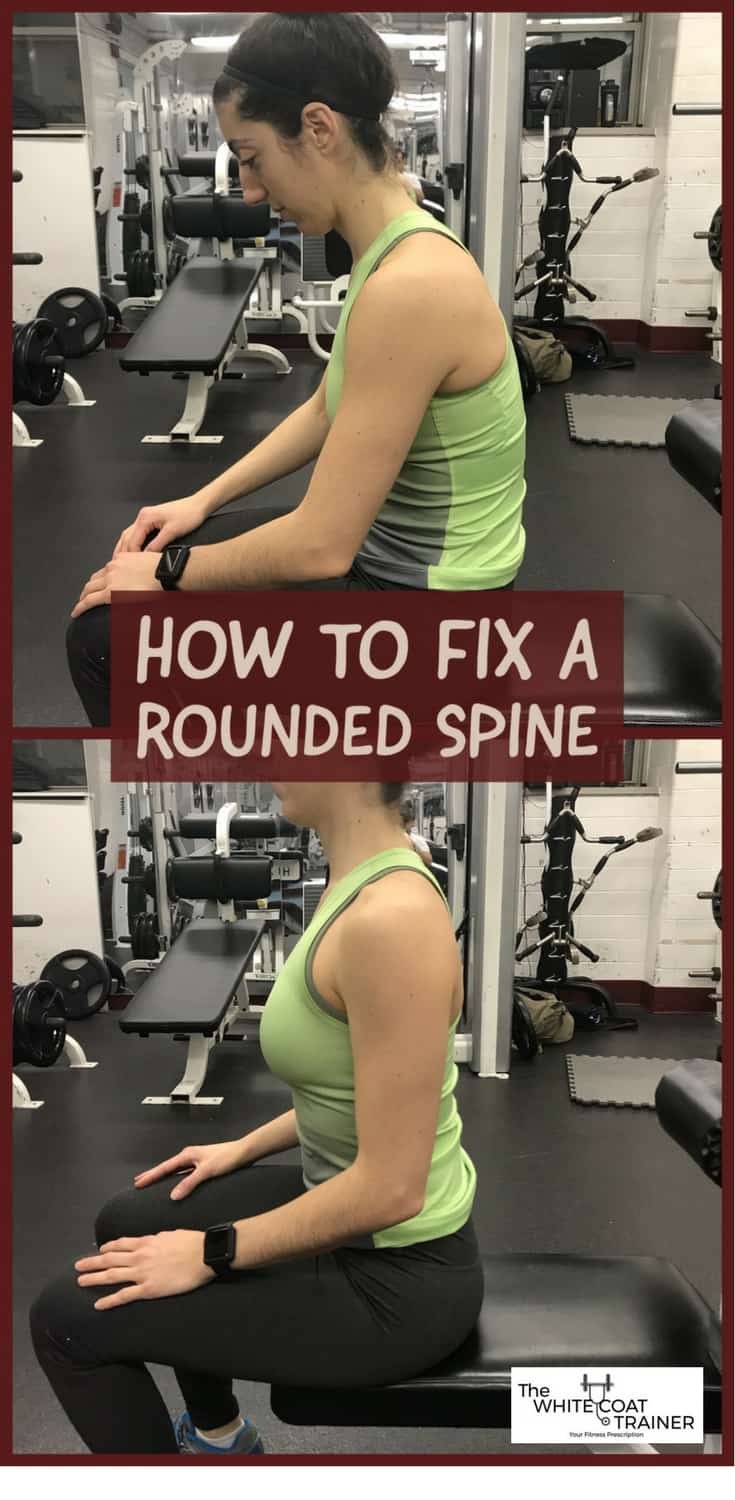
In order to reverse kyphosis, you need to
- Strengthen the weak/elongated muscles of the upper back
- Stretch the tight/contracted muscles of the upper chest
Weak/Stretched Muscles
- The Rhomboids
- The Mid and Low Traps
Your back muscles are meant to retract and bring items closer to you.
With a rounded spine, these muscles are always in the opposite position- protracted, lengthened, and weak. These muscles include the rhomboids, which are between your scapula (aka shoulder blade), and the middle and lower traps.
Tight/Overactive Muscles
- Chest
- Anterior Shoulders
With a hunched posture, the muscles on the anterior side of your torso are constantly flexed.
This includes your chest muscles and your anterior shoulders.
Bad Posture Exercises For Kyphosis
When you are in a kyphotic posture, the muscles of your anterior torso are tight and overactive.
Therefore, you must avoid chest-dominant pressing exercises that shorten these muscles further.
These include:
- Bench Press
- Push-ups
- Dumbbell Flys
In general, pressing exercises are good for you and should be trained regularly. However, if you have kyphosis, you should limit the amount of anterior pressing exercises you do.
Also, you want to avoid exercises that lengthen and stretch your back muscles even further.
These include:
- Crunches
- Sit-ups
- Hamstring Stretches with a Rounded Spine
The Best Posture Correction Exercises For Kyphosis
So what exercises help improve postural misalignments in kyphosis?
First, let’s go over the best stretch.
The Best Posture Correction Stretch For Kyphosis:
The Double Overhand Stretch
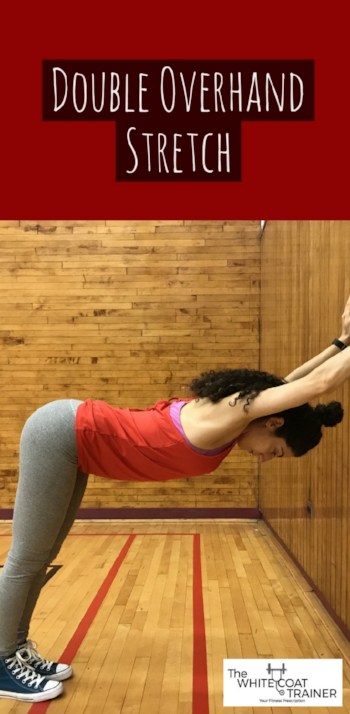
The double overhand is a great stretch that can be performed just about anywhere. Place your hands against a wall. Keep your arms straight and push your chest and head down towards the floor. You should feel a great stretch along your chest and a tightening of your upper back muscles.
Hold this stretch for 20-30 seconds. Perform it often, at least once a day.
Thoracic Extensions
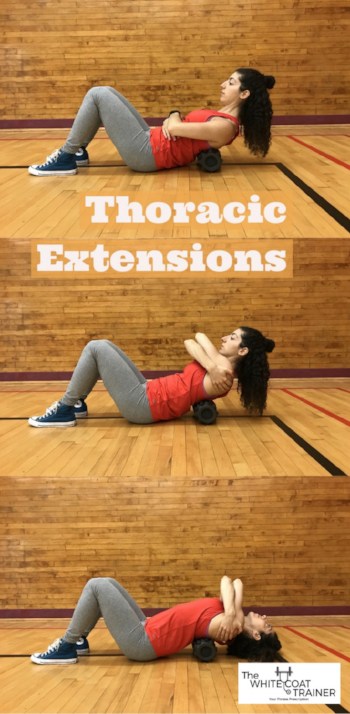
This stretch helps to re-position your spine back into its normal anatomical location. It also feels great.
Place your upper back on a foam roller, and extend or arch your upper back over it while keeping your low back neutral.
You can do it while sitting on a chair, which is great for you while you’re at work.
Perform 2-3 sets of 10 repetitions daily.
You can even do this exercise while on your seat, using the top of the backrest as the fulcrum.
The Best Upper Back Posture Exercises
All Horizontal Pulling Exercises
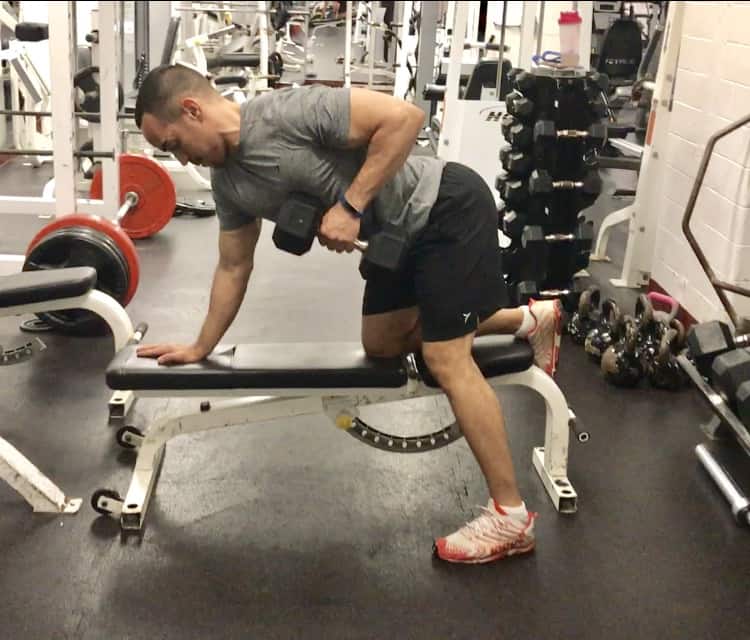
Horizontal pulling exercises help to reset your natural shoulder position and offset the muscle imbalances that exist between the front and the back of your torso.
Be sure to keep your shoulders back and externally rotated when performing them.
We discuss the horizontal pull and the 5 other functional movement patterns here.
Band Pull Aparts
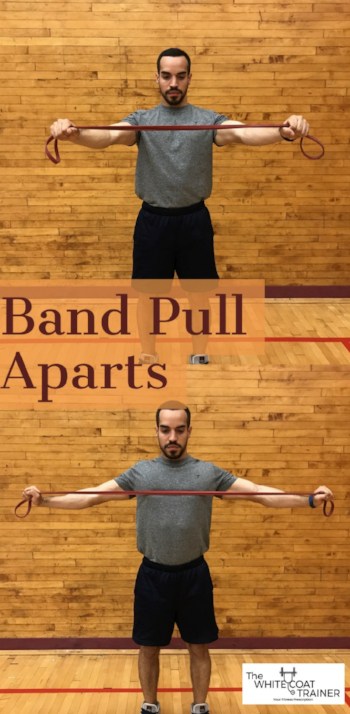
The band pull-apart exercise recruits all of the upper back muscles simultaneously.
Get a long-closed-loop resistance band and hold it at the level of your chest. From here, just pull it apart until it touches your chest.
Keep your elbows completely locked and retract your scapula at the end range.
If you don’t have one, order them here if you need (the lightest band should suffice)
Good Posture Tips to Reset a Rounded Thoracic Spine (At Home or At Work)
Use this sequence to reset your thoracic spine back into the correct position whenever you notice that you’re not in an optimal position.
- Engage your ab muscles while sitting
- Sit all the way back in your seat, keeping your upper back in contact with the backrest.
- Shrug and roll your shoulders back to reset them to their natural position
Up next are the rounded shoulders.
Can Rounded Shoulders Be Reversed?
Rounded shoulders is another common postural fault that you may have.
It often coexists with kyphosis.
In order to reverse a rounded shoulder posture, you need to
- Strengthen the weak/elongated muscles of the upper back and shoulder
- Stretch the tight/overactive muscles of your upper chest and shoulders
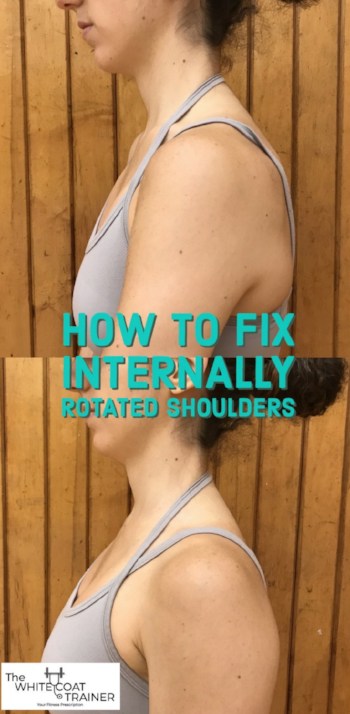
Weak/Stretched Muscles
- Posterior Shoulder
- Rotator Cuff
As your shoulders rotate inwards, your posterior shoulders lengthen and weaken. Just like in the rounded spine posture, your upper back also gets pulled forward and these muscles are lengthened.
In addition, some of the muscles in your rotator cuff get weak as well. That’s because some of the rotator cuff muscles work to externally rotate the shoulder and keep them pulled back.
Tight/Overactive Muscles
- Anterior Shoulders
- Chest
Conversely, the chest and anterior shoulders are overly activated and tight in the internally rotated posture.
This leads to a lot of anterior shoulder pain and tendon strains. This is one reason why the rotator cuff is quick to get injured.
Bad Posture Exercises For Internally Rotated Shoulders
A lot of the same muscular faults present in kyphosis are also present in internally rotated shoulders.
You should avoid doing too many chest dominant pressing exercises
These include:
- Bench Press
- Push-ups
- Dumbbell Flys
And exercises that cause internal rotation of the shoulder
These include:
- Pull-ups
- Chin-ups
- Lat Pulldowns
The Best Posture Correction Exercises For Rounded Shoulders
Posture Correction Stretch For Rounded Shoulders
Doorway Stretch with External Rotation
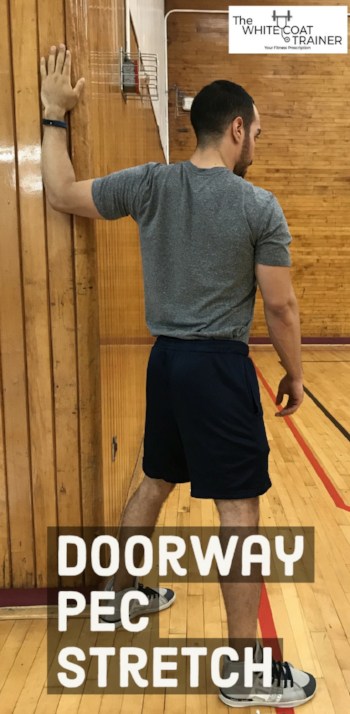
The doorway pec stretch is extremely effective in restoring natural motion to your chest and shoulder joint. You can do it in a doorway (to do both arms simultaneously) as we show in 9 Incredible Stretches To Improve Flexibility Fast or on a corner wall.
Simple position your bent elbow on the edge of a doorway and open your chest up in the opposite direction.
Focus on externally rotating your shoulders and hold this stretch for at least 20 seconds.
Shoulder Posture Exercises
Rear Delt Flys
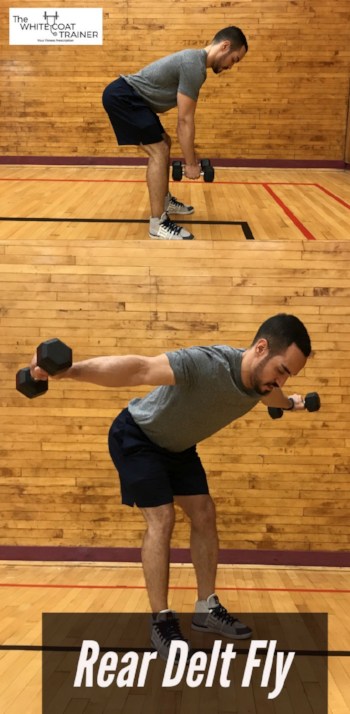
It is embarrassing how weak and underused the posterior muscles are in the general population.
Get a light pair of dumbbells and bend over at the waist. From here lift the dumbbells up toward the ceiling and retract your scapula. Keep your elbows relatively straight.
When performing this shoulder strengthening exercise, it is important to check your ego. 5-10 lbs will be more than sufficient in activating your posterior shoulders. Do 2-3 sets of 8-12 reps.
Band Pull Aparts

The band pull-apart is also a great way to help reverse rounded shoulders.
Do this exercise for 12 + reps using a resistance band.
Get a resistance band from Amazon for cheap right here.
Keep your elbows completely locked and retract your scapula at the end range.
Band External Rotations
The external rotation is the last exercise you can do to help improve your rounded shoulders.
Here’s what it looks like.
Keep your elbow close to your body and at a 90 degree angle. Rotate your elbow out to your side while keeping it in contact with your side.
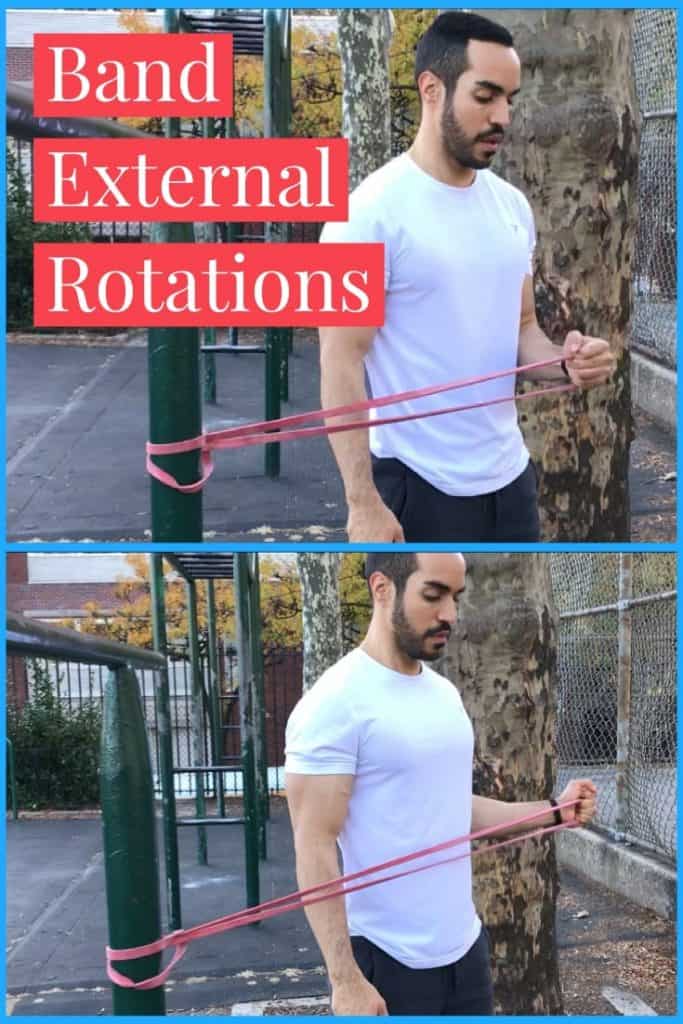
Good Posture Tips to Reset Rounded Internally Rotated Shoulders (At Work or Home)
Use this sequence to reset your shoulders back into the correct position whenever you notice that you are not in an optimal position.
- Shrug and roll your shoulders back to reset them to their natural position
- Externally rotate your arms by facing your palms forwards and retracting your scapula
Okay lastly, we are going to cover anterior pelvic tilt, aka lordosis.
Can Anterior Pelvic Tilt (Lordosis) Be Reversed?
Last up is anterior pelvic tilt, aka lordosis. This posture is extremely common, and one of the biggest causes of low back pain.
To reverse it, you must
- Strengthen the weak/elongated muscles of the glutes and abs
- Stretch the tight/overactive muscles of the low back and the hips
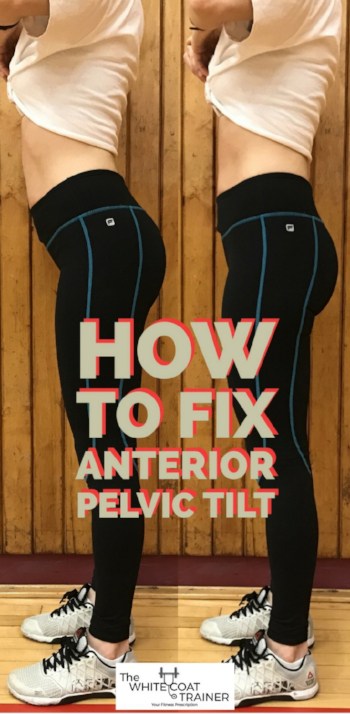
Weak/Stretched Muscles
1. Glutes
Excessive lordosis will cause your butt to stick out which is considered attractive by some, but actually very detrimental to your spinal health.
Your glutes need to be strong and be able to FULLY extend your hips. This is the only way to keep your spine neutral.
2. Hamstrings
If your pelvis is tilted forward, the muscles that attach to the back of your hips are stretched and elongated.
These are the hamstring muscles.
Stop stretching your hamstrings if you exhibit an anterior pelvic tilt.
3. Abs
Your six pack muscles attach to your pelvis on the front side. With a forward tilt, the abs are lengthened, weakened, and bellow out.
This is the semi-pregnant look that some people exhibit if they let their stomach muscles relax.
That’s why you must train your core muscles.
Almost everyone can benefit from having a stronger midsection.
Tight/Overactive Muscles
1. Low Back / Erector Spinae
Your lumbar spine will take the majority of the burn in a lordotic posture. The muscles of the low back aka the erector spinae are in constant tension and are easily strained, leading to spinal misalignments and low back pain.
2. Hip Flexors
The hip flexors which sit on your anterior thigh are the major contributors to shifting your pelvis anteriorly.
Prolonged sitting is a big culprit in making these muscles tight and overactive which tugs on the pelvis.
Bad Posture Exercises For Anterior Tilt
The anterior pelvic tilt is a really common postural fault.
Your glutes and hamstrings are weak and elongated, while hip flexors and low back are tight and stiff.
You need to avoid exercises that extend the low back, such as:
- Supermans
- Back hyper-extensions
- Upward dog yoga pose
You need to avoid exercises and activities that tighten the hip flexors, further such as:
- Sit-ups
- Crunches
- Sitting for prolonged periods of time
And you need to avoid exercises that lengthen or stretch the hamstrings, such as
- Sit and reach hamstring stretch
- Touch your toes hamstring stretch
The Best Posture Correction Exercises For Anterior Pelvic Tilt
Posture Correction Stretches For The Hips
Kneeling Hip Stretch
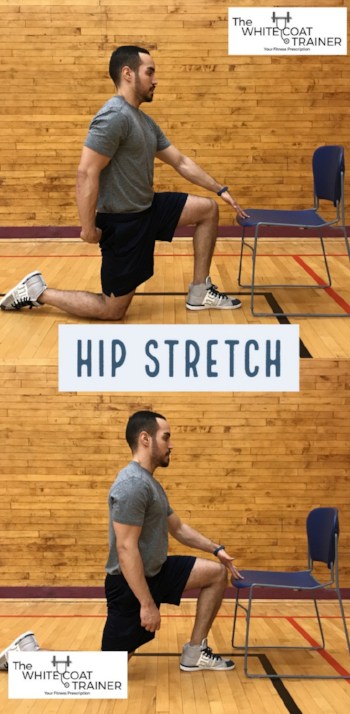
The kneeling hip stretch is the most basic stretch you can do.
When performing this stretch ensure that your hip is perfectly in line with your spine, and activates your glute muscles.
This will put you into a posterior pelvic tilt and get your spine in a neutral position.
Only then should you lean forward. Hold this stretch for 20-30 seconds, and do it every single day.
The Couch Stretch
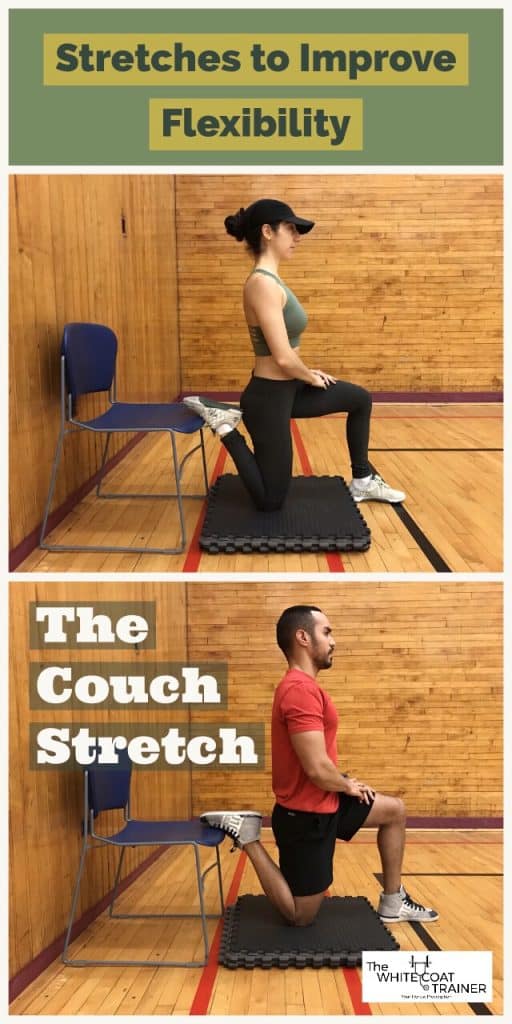
The couch stretch is the advanced version that will stretch the entire hip flexor/quad combination.
It is similar to the hip flexor stretch, except, you will have your back foot elevated on a couch or a chair.
Again, don’t forget to get into a posterior pelvic tilt.
Hold this position for 20-30 seconds and do it every single day.
The Best Exercises To Reverse Pelvic Tilt
The Glute Bridge

The glute bridge exercise teaches the importance of activating and strengthening the abs and the glutes while providing a gentle stretch to the hip flexors.
From a lying position, simply squeeze your glutes as hard as you can to elevate your hips off the ground while your feet are planted on the ground.
Perform this exercise for sets of 10 reps with a 1-second hold at the top.
To increase the activation of the glute muscles, place an elastic band around your knees.
Our favorite is the Hip circle from Amazon.
Once that gets too easy, you can do the variations found in our bodyweight leg exercises post.
The Hollow Body Hold
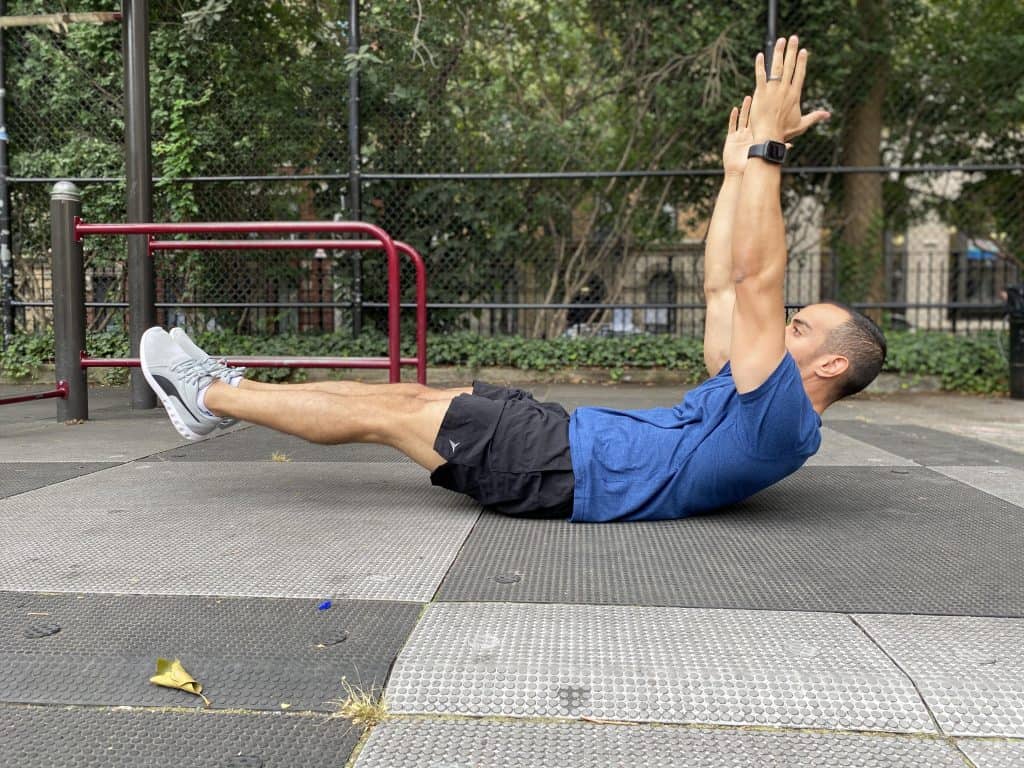
The hollow body hold is one of the best core exercises you can do to help improve your posture.
To do it, elevate your feet, arms, and upper back off the floor and hold this position.
When doing the hollow body hold, make sure that your low back is completely flat on the ground. This will posteriorly tilt your pelvis In fact, as we describe in our core exercise post.
Perform this exercise for sets of 30 seconds, and make sure that your low back never arches!
Any Hip Extension Strengthening Exercise
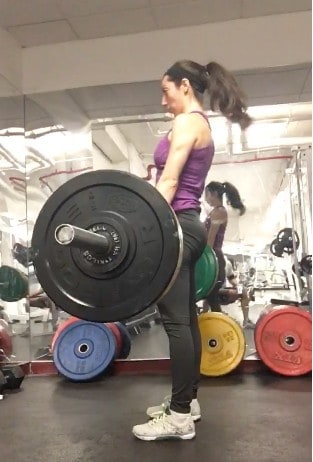
Hip extension exercises activate the glute muscles while providing a gentle stretch to the anterior hip flexors.
When doing these exercises, it is important to stop your low back at the neutral position, and not let it arch! Let the focus of the exercise be on squeezing your glutes to finish the lift.
Refer to our post, The Only Exercises You Need To Build Muscle and Get In Shape to find the best movements that train hip extension.
Good Posture Tips to Reset an Anterior Pelvic Tilt (At Work or At Home)
- Squeeze your glutes often when standing
- Tighten and brace your core often throughout the day
Use this sequence to reset your lumbar spine back into the correct position whenever you notice that you are not in an optimal position.
To Recap: What Exercises Help Improve Poor Posture?
So the best exercises to help improve posture will be ones that
- Stretch your posterior neck
- Stretch your chest
- Stretch your anterior shoulders
- Stretch your hip flexors
- Extend your thoracic spine
and
- Strengthen your neck flexors
- Strengthen your rhomboids and middle traps
- Strengthen your core muscles
- Strengthen your glutes
- Strengthen your hamstrings
Frequently Asked Posture Questions
How Do I Correct / Fix My Posture Fast?
To correct your posture fast, you need to spend more time in correct anatomical positions, while minimizing time in bad postural alignments.
So, in addition to doing the exercises above, you need to
- Stand evenly on your feet
- Keep your feet shoulder width apart with your toes pointing forward
- Stand tall
- Keep your neck in a neutral position
- Walk and stand with your thumbs pointing forward
- Pull your shoulder blades back and perform a shoulder blade squeeze from time to time.
- Keep your stomach 10-20% braced most of the time
- Keep your glutes activated when standing or walking
It is important that you practice every single day. The more time you spend in good positions, the more natural it will become.
Secondly, use the exercises in this post for 10 minutes a day, 4-7 days a week.
How Long Does It Take To Correct Posture?
It depends on how much work you put into it.
If you practice every single day, you should notice improvements in 1-2 months. Sometimes even less.
Do Posture Correctors Really Work?
They certainly can help. A posture corrector works by pulling your shoulder blades back and keeping your thoracic spine extended. This will help reverse
- kyphosis
- rounded shoulders
- and forward neck
With that said, it is important that you try to maintain this corrected position even when you’re not using the device.
This one on Amazon is a best-seller and is pretty cheap.
How Can I Stop Slouching?
The fact that you’re noticing a slouch is already impressive. Most people just sit slouched all day and never even realize it.
Acknowledging and identifying a slouch is already half the battle. Once you feel yourself slouching, use the posture reset tip below.
This will help get you into a neutral position.
The second thing you should do is fidget.
Try to change the position you are in every 10 minutes or so. This will help prevent you from being in one fixed muscle contraction for too long.
Can You Permanently Fix Posture?
Yes and no. Posture is something that you need to continue working on on a daily basis.
It’s just like a diet.
If you stop doing it, you will eventually wind up right back where you started.
The good news is…
It gets a lot easier the more you practice.
The goal is not to have perfect posture. Instead, focus on having better posture!
Additional Resource For More Posture Corrective Exercises
Don’t forget to check out our complete 10-minute posture and mobility program.
It contains a highly actionable routine that you do from the comfort of your own home.
There is an upper body mobility workout and a lower body mobility workout.
Start fixing your posture right away!
Final Words On Correcting Poor Posture
Getting better posture is not an overnight process.
It requires complete awareness of healthy positions your body should be in and suboptimal positions that you should avoid.
Identify which postural inefficiencies you have and start fixing them today.
Use these exercises and stretches for 10 minutes a day 4-7 days a week.
Some of these could even be done while you are out and about doing your daily activities.
Use the postural awareness cues as often as you can remember to reset your body positions.
Once you realize the importance of posture, you will begin to treat your body like the sanctuary that it is. You will move and feel better.
Related Posts On Better Posture:
- How Flexible Are You? 5 Useful Ways To Find Out
- How To Keep Your Body Flexible With The 9 Most Effective Stretches
- The 17 Best Core Exercises (To strengthen your core and improve your posture)
Now we turn it over to you.
Which of these bad postures do you normally see on a daily basis?
Do you try and improve your body position throughout the day?
Which of these stretches/exercises do you already incorporate into your training?
Comment below and let us know!

Alex Robles, MD, CPT / Brittany Robles, MD, MPH, CPT
Alex & Brittany Robles are physicians, NASM CPTs, health & fitness experts, and founders of The White Coat Trainer: a site dedicated to improving the health and fitness of busy professionals. Their advice has been featured on KevinMD, The Doctor Weighs In, My Fitness Pal, Reader’s Digest, Livestrong, and The Active Times. Learn more about them here.

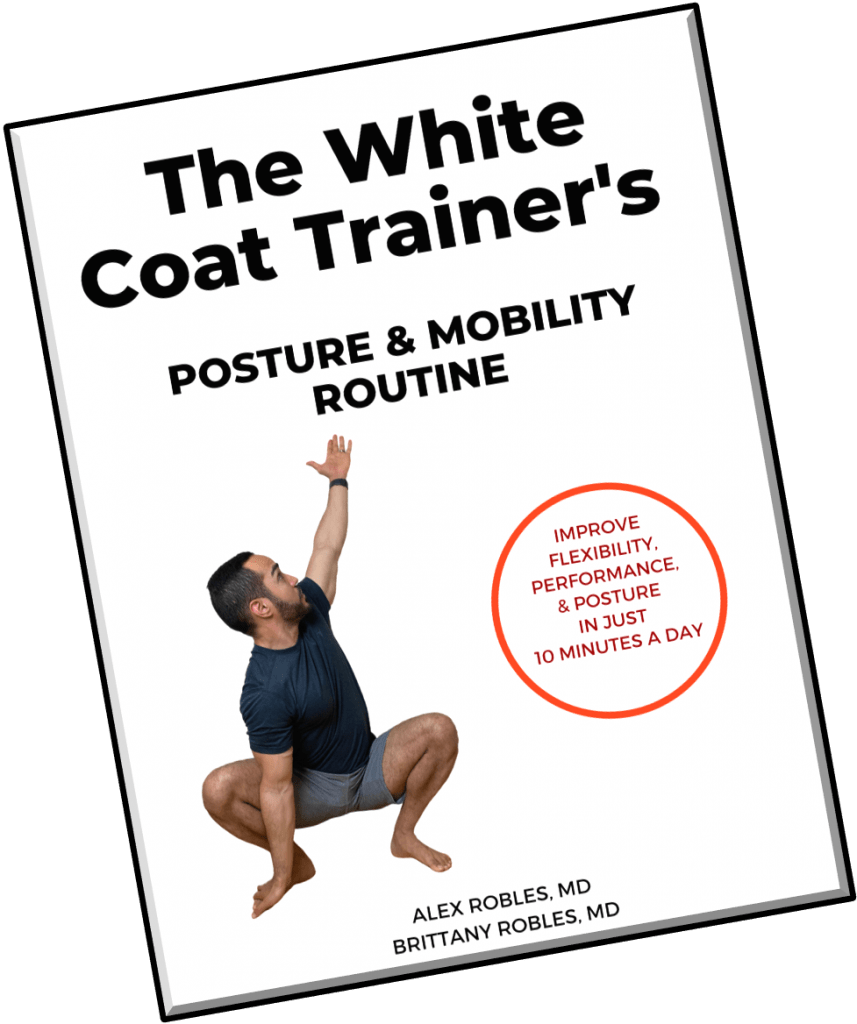
Hey, i liked the content it pretty interessting , specially thestretche that are helping alot i’ve experienced that issue and fixing posture is one of the huge challenges that I faced in the gym,I’m doing gym for almost 3 years, I had some gains in the first year by working hard and eating healthy but they weren’t that obvious, I started to believe that my hormones and metabolism are shitty and i wanted to give up since I’m putting a lot of work but getting low results. then something happened I emailed a physiotherapist coach his famous he has a youtube channel named Athlen-x ( i’m not promoting he’s channel tho he has already 5 Million subscribers xD xD ) so he pointed me to the right direction, I could spot the main problem (Posture) so I started looking for ways to do it I ended up buying a programme that worked well for me and the next 2 years i literarly gained 17 pounds,and I want to advise you to do the same cause seriously you need a professional knowledge of that issue and CONSISTENCYhere is a programme that you may be interested in it will help i viewed its content and yeap it target the main sources of the problems too https://bit.ly/2jxOJqZ its legit and wish you all the best, Keep up if you truly put work and the right knowledge you will do it, just don’t give up on your self.
Improper posture can result in severe complications regarding your spine.
I really appreciated this article! I am an ultrasound technologist and I constantly come home with shoulder & back pain from scanning my patients. These easy exercises have already made my trapezius & shoulder muscles feel great and now I am aware of some of my postural habits! Thank you again!
Thanks for you comment Kaitlyn. I’m glad you have seen good results using these exercises!